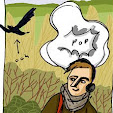I like to joke that I feel bullied after doing the anti-bullying content -- ground down by exposure to miserable content, comic sans, tales of terrible suffering -- but there is a serious point there. Exposure to concentrated information about an issue can make you more likely to suffer it; or, to put it better, information aimed at awareness-raising can actually increase feelings of victimisation and powerlessnes, if it lacks strategies to decrease the problem or increase resilience.
Checking back over my notes, I found this very revealing comment from a presentation about online safety: harassing individuals report being harassed; bullies report being bullied.
This insight isn't very difficult, if you can step back from a moment from the langauge or victim and perpetrator. People who act in an inflammatory and unsafe way online are likely to suffer reprisals. You could argue that they deserve it. Possibly they do; however, although some people are malicious, others are (also) young, inexperienced or may simply make mistakes. Things that start by accident can become habits, or get out of control. Things done thoughtlessly can quickly become entrenched in a mass of bad feelings and message board spats, and it's all too easy to get into a vast and pointless cycle of bad behaviour and suffering.
When I started writing up guidelines for supporting young people online, among the things to do if young people start flaming, bullying, or making false accusations, I included "always offer cyberbullying support". It's a temptation, in the online world of anonymous comments, to think that the rules of Do As You Would Be Done By can safely be ignored. However, even the safely anonymous can't escape from the fact that aggressive interactions will lead to negative experiences.
Another thing on the list is "diversion", recognising that boredom and neglected spaces encourage bad behaviour. If bad things are happening, put up a video, link to a game or upcoming activity, give people something to do. Refresh your page. The question presented in the picture below, "why are we always interacting with the most irritating individuals?" betrays the vulnerability of the purely reactive; you must do positive, interesting things, too.
As you can tell by my expression in the picture above, the last thing you may feel like doing is being positive and creative when someone has been nasty and hateful. But it's a crucial part of being resilient, and resilience is key to emerging emotionally unscathed from aggressive situations. That, and knowing that it's OK not to respond, that you can just walk away, that it's not an admission of defeat to drop or friendslock an online identity, any more than it is to have locks on your front door and chain up your bicycle.
Surprisingly often, online, doing nothing is the best response. Walk away, don't rise to jibes, don't respond, do another thing. And if things get too aggravating, delete your Facebook. You can always get another one.



